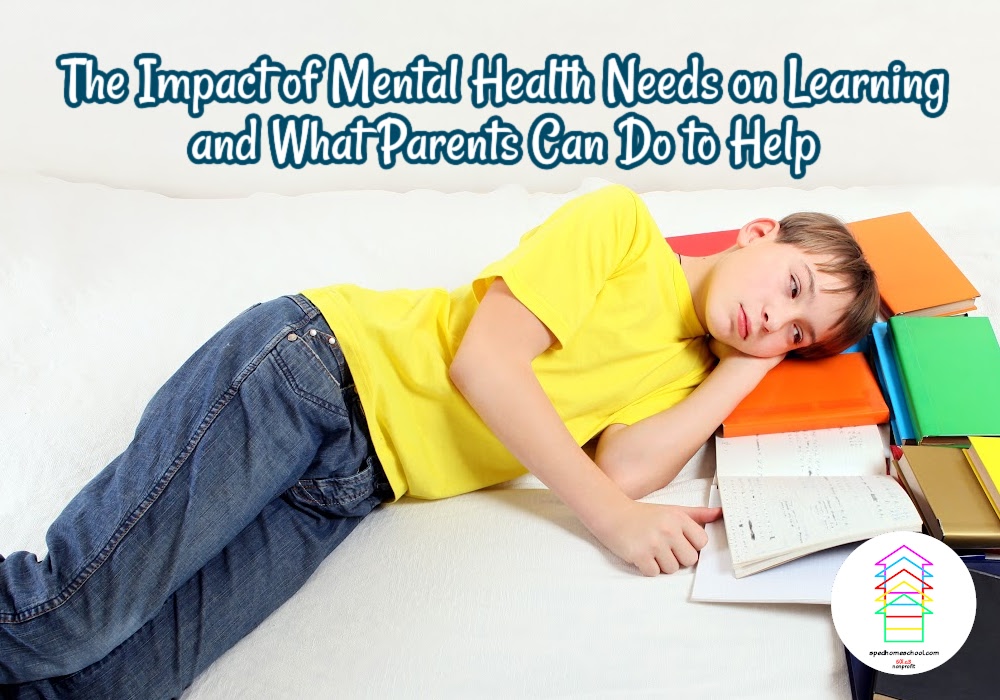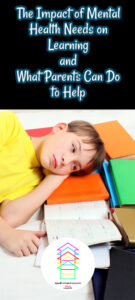
by Cheryl Swope, M.Ed., Simply Classical Curriculum, Myself & Others Curriculum, and Cheryl Swope Consulting
“My child doesn’t have special needs. They just have anxiety, depression, and OCD.” I often hear such statements. Parents sometimes wonder why a child struggles with learning when they don’t have “special needs,” as if only Down syndrome or severe autism impacts learning!
As many of us can attest, any mental turmoil can dramatically affect a child’s ability to concentrate, perform consistently, and feel accomplished academically. Rather than ignore these issues, we would do well to take note. Mental health concerns appear to be on the rise for children. In a recent study of 8,000 teens in the United States in 2021, 44% say they feel “persistent feelings of sadness of hopelessness,” which is up from 26% in 2009. Even 29%, more than 1 in 4, seems high. The 2021 percentage – 44% – is the highest level of teenage depression ever recorded.
One widespread cause seems clear. According to a Cambridge study of 84,000 individuals, social media use was strongly associated with worsening mental health. A particularly vulnerable group appears to be girls ages 11-13. Instagram’s own internal research noted that one-third of all teenage girls said “Instagram made them feel worse,” even though these girls “feel unable to stop themselves” from logging on. (Read more in The Atlantic April 13, 2022 article, “Why American Teens Are So Sad.”)
What can we do? One straightforward antidote is simply going “cold turkey,” as we would with any addiction or compulsion, and substituting something much healthier and more satisfying. Church attendance, heart-to-heart conversations, good books, art classes, team sports, individual exercise like swimming or running, volunteering, or outings with friends will almost certainly, if only gradually, improve a child’s well-being. (Pair this with professional medical or integrative treatment as needed.)
Another culprit according to the writer of the article referenced above, is modern parenting. By extension, this may include modern homeschooling. Rather than teach our child to enjoy the uniquely gratifying pen-to-paper expression of writing by hand, we scribe all of their work for them. Rather than expose our dog-averse child to the neighbor’s easygoing Cavalier King Charles Spaniel, we shield them from all dogs. Rather than teach our resistant child to enjoy gratifying pen-to-paper written expression, we scribe all of their work for them. Rather than teach the child to set the table, make their bed, or empty the dishwasher, we do all of these things for them. Rather than introduce the vegetables, fats, and proteins they needs for optimal brain health, we allow the sugary snacks or textures they prefer. Rather than invite an agreeable child to play, we avoid playdates altogether. We give the child the impression that we do not think they can handle much at all.
Persistent rescuing emboldens anxiety and may worsen other conditions. We convey our anxiety about their anxiety and only compound the problem. When a child is depressed and wants to be alone, we can honor their request at times, but we also need to plan enjoyable outings, active sports, or nature walks. We can also make a point of visiting others who need cheering. For the obsessive child, such social distractions often help. For example, when a child compulsively checks something a certain number of times, to “prevent” doom from befalling a family member, we can work with a therapist to include exposure techniques that embolden the child to see the fallacy of their previous thinking. When they learn that all will be well even when they do not check, they can better enjoy the freedom to allow themselves not to engage in such checking and spend their time in pursuits that truly do help others.
Consider these resources to help with the above:
- My Thankfulness Journals – Beginner and Intermediate – to replace self-pity with gratitude.
- My Nature Journal – to gift a child with the wonder of nature through simple walks, drawings, and reflections.
- Myself & Others: Lessons in Social Understanding, Habits, & Manners – to explore the feelings of others and build healthier habits in this 14-week series for children ages 4-13.
Accommodations have become an understandable norm of good parenting, but we need to be careful. The desired result of parenting is not the absence of all uncomfortable feelings, but rather the resilience to carry on in spite of them. Let’s return to what we know: Children need good playmates, even if they cannot yet manage to establish true “friends.” Children need to build competence academically, even if this requires step-by-step instruction. Children need to learn that they can happily and freely live outside of the little screen on any device to see the real world around them. They can be brave, capable, and thoughtful toward others, as this may be the best and surest way to overcome sadness and hopelessness. As we help our children see their purpose, we can reintroduce our children to the importance of becoming strong, resilient people in their families, churches, and neighborhoods who love, care for, and appreciate those around them with greater confidence, compassion, and cheer.
Cheryl Swope, M.Ed., is the author of Simply Classical: A Beautiful Education for Any Child (Memoria Press, 2nd edition, 2019) and the Simply Classical Curriculum (Memoria Press) for children with mental, physical, and emotional special needs. She and her husband live in a quiet lake community in Missouri with their adult twins who have autism and schizophrenia and who serve others in numerous ways.

